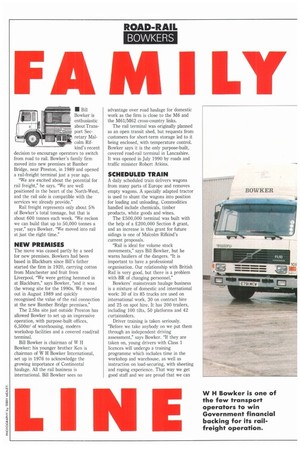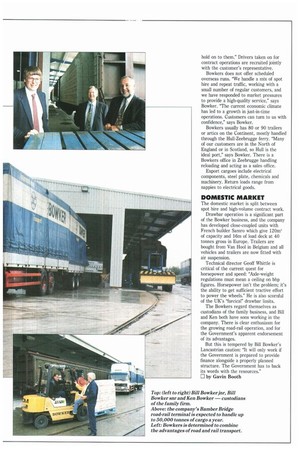I; A ILIT _ 4a=ank • Bill
Page 32

Page 33

If you've noticed an error in this article please click here to report it so we can fix it.
Bowker is enthusiastic about Transport Secretary Malcolm Rifkind's recent decision to encourage operators to switch from road to rail. Bowker's family firm moved into new premises at Bamber Bridge, near Preston, in 1989 and opened a rail-freight terminal just a year ago.
"We are excited about the potential for rail freight," he says. "We are well positioned in the heart of the North-West, and the rail side is compatible with the services we already provide."
Rail freight represents only about 5% of Bowker's total tonnage, but that is about 600 tonnes each week. "We reckon we can build that up to 50,000 tonnes a year," says Bowker. "We moved into rail at just the right time."
NEW PREMISES
The move was caused partly by a need for new premises. Bowkers had been based in Blackburn since Bill's father started the firm in 1920, carrying cotton from Manchester and fruit from Liverpool. "We were getting hemmed in at Blackburn," says Bowker, "and it was the wrong site for the 1990s. We moved out in August 1989 and quickly recognised the value of the rail connection at the new Bamber Bridge premises."
The 2.5ha site just outside Preston has allowed Bowker to set up an impressive operation, with purpose-built offices, 6,500m2 of warehousing, modern workshop facilities and a covered road/rail terminal.
Bill Bowker is chairman of W H Bowker: his younger brother Ken is chairman of W H Bowker International, set up in 1976 to acknowledge the growing importance of Continental haulage. All the rail business is international. Bill Bowker sees no advantage over road haulage for domestic work as the firm is close to the M6 and the M61/M62 cross-country links.
The rail terminal was originally planned as an open transit shed, but requests from customers for short-term storage led to it being enclosed, with temperature control. Bowker says it is the only purpose-built, covered road-rail terminal in Lancashire. It was opened in July 1990 by roads and traffic minister Robert Atkins.
SCHEDULED TRAIN
A daily scheduled train delivers wagons from many parts of Europe and removes empty wagons. A specially adapted tractor is used to shunt the wagons into position for loading and unloading. Commodities handled include chemicals, timber products, white goods and wines.
The £500,000 terminal was built with the help of a £200,000 Section 8 grant, and an increase in this grant for future sidings is one of Malcolm Rifkind's current proposals.
"Rail is ideal for volume stock movements," says Bill Bowker, but he warns hauliers of the dangers. "It is important to have a professional organisation. Our relationship with British Rail is very good, but there is a problem with BR of changing personnel."
Bowkers' mainstream haulage business is a mixture of domestic and international work: 30 of its 85 trucks are used on international work, 30 on contract hire and 25 on spot hire. It has 200 trailers, including 100 tilts, 50 platforms and 42 curtainsiders.
Driver training is taken seriously. "Before we take anybody on we put them through an independent driving assessment," says Bowker. If they are taken on, young drivers with Class 1 licences will undergo a training programme which includes time in the workshop and warehouse, as well as instruction on load-securing, with sheeting and roping experience. That way we get good staff and we are proud that we can hold on to them." Drivers taken on for contract operations are recruited jointly with the customer's representative.
Bowkers does not offer scheduled overseas runs. "We handle a mix of spot hire and repeat traffic, working with a small number of regular customers, and we have responded to market pressures to provide a high-quality service," says Bowker. "The current economic climate has led to a growth in just-in-time operations. Customers can turn to us with confidence," says Bowker.
Bowkers usually has 80 or 90 trailers or artics on the Continent, mostly handled through the Hull-Zeebrugge ferry. "Many of our customers are in the North of England or in Scotland, so Hull is the ideal port," says Bowker. There is a Bowkers office in Zeebrugge handling reloading and acting as a sales office.
Export cargoes include electrical components, steel plate, chemicals and machinery. Return loads range from nappies to electrical goods.
DOMESTIC MARKET
The domestic market is split between spot hire and high-volume contract work.
Drawbar operation is a significant part of the Bowker business, and the company has developed close-coupled units with French builder Samro which give 120m3 of capacity and 16m of load deck at 40 tonnes gross in Europe. Trailers are bought from Van Hool in Belgium and all vehicles and trailers are now fitted with air suspension.
Technical director Geoff Whittle is critical of the current quest for horsepower and speed: "Axle-weight regulations must mean a ceiling on bhp figures. Horsepower isn't the problem; it's the ability to get sufficient tractive effort to power the wheels." He is also scornful of the UK's "farcical" drawbar limits.
The Bowkers regard themselves as custodians of the family business, and Bill and Ken both have sons working in the company. There is clear enthusiasm for the growing road-rail operation, and for the Government's apparent endorsement of its advantages.
But this is tempered by Bill Bowker's Lancastrian caution: "It will only work if the Government is prepared to provide finance alongside a properly planned structure. The Government has to back its words with the resources."
El by Gavin Booth
















































































